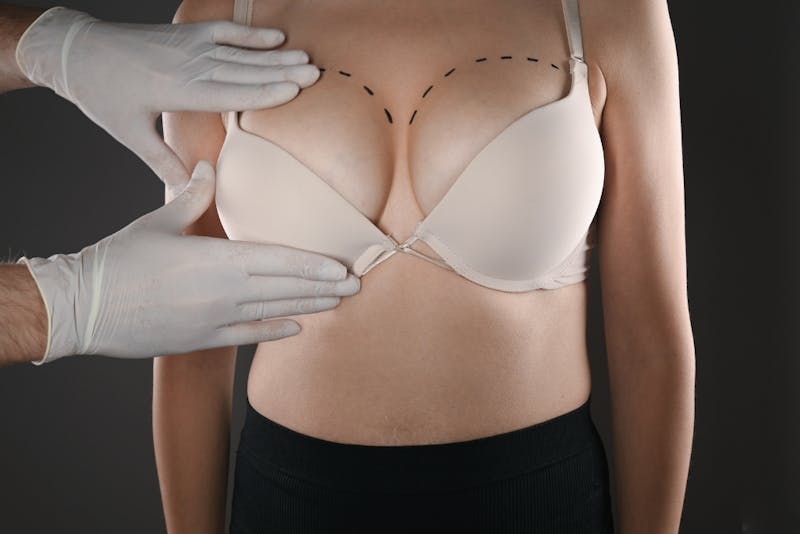
Sometimes called breast implant removal surgery, breast explant surgery removes implants put in place during breast augmentation. Patients may seek explant surgery for a variety of reasons. Complications can occur like leaky or ruptured implants. Sometimes, you may simply dislike how the implants look. Even in the case of successful augmentation, you will eventually need to have explant surgery as implants are likely to need removal in your lifetime, with an average of about 10 years. Another increasingly common reason for explant surgery is a diagnosis of Breast Implant Illness (BII). BII is a topic outside of the scope of this blog and is covered separately.
If you are considering breast explant surgery for any reason, proper preparation is important to ensuring a smooth recovery with minimal complications. Below, we will provide five preparation tips for those undergoing explant surgery.
Breast Explant Surgery: Preparation
Get A Medical Consultation
As with any other surgery, you need a consultation prior to getting breast explant surgery. Not only does this ensure you are healthy enough to undergo the procedure, it can help your medical team decide on a treatment path if you’re planning on repositioning or replacing your implants or considering alternative forms of breast augmentation.
During your consultation, you’ll undergo a physical exam and have routine blood work done to make sure you’re healthy enough for anesthesia, surgery, and recovery. You will also discuss your lifestyle with your medical team. You may be asked to make certain changes – like losing weight or quitting smoking – prior to getting medical clearance for surgery.
You can also address any issues specific to you during your consultation. If you’re removing your implants because you were unhappy with your final results, for example, you can talk about possible alternatives like fat grafting or trying a different type of implant.
Adjust Your Medications
You should come to your initial consultation with a full list of any medications you take – including over-the-counter medications – to give to your medical team. You may need to temporarily stop taking certain medications or significantly reduce your dosage.
For example, aspirin, anti-inflammatory medications, and certain herbal supplements can increase your risk of bleeding, making post-surgical complications more likely. It is very important to talk about your medications closely with your surgeon and medical team and make the necessary adjustments prior to undergoing breast explant surgery.
Make Arrangements With Your Insurance
While cosmetic surgery is typically not covered under health insurance, this is not always the case. In fact, you may be surprised to learn there are many instances in which explant surgery is covered fully or partially by insurance.
Most insurance policies cover reconstructive breast surgery after cancer treatment, and will therefore likely cover any subsequent explant surgery that is needed to maintain results. Health insurance may also cover explant surgery if it’s deemed “medically necessary” due to complications like ruptures, capsular contracture, fat necrosis, and so on. However, policies vary, and some companies may not cover the removal of breast implants for a variety of reasons. Non-medically necessary removal is less likely to be covered.
Providing thorough documentation to your insurance company – including a detailed letter from your doctor or surgeon – may help increase the likelihood your policy will cover at least part of your surgery. Back and forth regarding claims and coverage can be lengthy, so make sure to start the paperwork well ahead of time.
Prepare For Some Downtime
Full recovery from breast explant surgery takes between six to eight weeks, although most patients can return to work within two weeks. Make sure to prepare for downtime immediately following surgery as you’ll experience considerable difficulty engaging in normal day-to-day activities.
Stock up on at least two weeks worth of groceries, medications, and household items like paper towels and toilet paper. As side effects like nausea and pain are common after surgery, have items like Gatorade, ginger ale, and over-the-counter painkillers on hand.
Arrange your house so everything you need is easily accessible as it may be hard to reach high places initially after surgery. As it can be difficult to get up and down stairs, you may want to sleep on the couch, so set up some sheets and bedding and put a TV table up where you plan to sleep, rest, and recover.
Make Sure You Have Support
You will need support for basic tasks, including enlisting someone to drive you home from the hospital the day of your surgery. Most people also need someone to help out around the house for the first few days with basic tasks like doing dishes and laundry and running small errands.
In some cases, you may need emotional support as well. If your implants were removed due to complications, this can be a disappointing, stressful experience – especially if you sought breast augmentation after undergoing a mastectomy for medical reasons. Talking to a therapist before or after explant surgery is recommended.
Breast Explant Surgery: The Bottom Line
Breast explant surgery can be an emotional experience that comes with considerable recovery time. The best way to ensure you have a good overall experience is to take steps ahead of time to prepare mentally and physically for your surgery and its aftermath.
Ready to get started? Leif Rogers is an Ivy League-educated, board-certified plastic surgeon and a standing member of the American Society of Plastic Surgeons. If you’re considering breast explant surgery, get in touch with his team to schedule a consultation.


